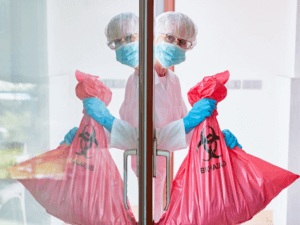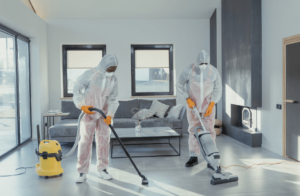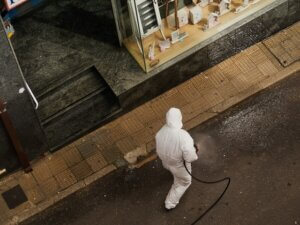Why You Should Never DIY Trauma Cleaning
Why You Should Never DIY Trauma Cleaning
Summary
In this comprehensive guide, we explore the dangers of attempting trauma cleaning yourself and emphasize the importance of relying on professional trauma cleaners. Trauma scenes are rife with biohazards and emotional distress, necessitating an understanding of the risks associated with DIY cleaning. This article delves into the complexities of trauma cleaning, underscoring why it’s prudent to entrust trained trauma cleaners for the safety of all parties involved.
Welcome to our comprehensive guide discussing the critical reasons why undertaking trauma cleaning yourself can be a risky endeavour and best left to professional trauma cleaners. Trauma scenes are fraught with biohazards and emotional distress, making it essential to understand the potential dangers of DIY trauma cleaning. In this article, we delve into the intricacies of trauma cleaning, highlighting why it’s best left to the trained trauma cleaners for the safety and well-being of everyone involved.
The Complex Nature of Trauma Scenes
Trauma scenes can be extremely complex in nature, whether resulting from accidents, crimes, or unattended deaths, they often involve hazardous biological materials such as blood, bodily fluids, and other contaminants. Properly cleaning and decontaminating these areas require specialized knowledge, equipment, and techniques. Attempting to clean such scenes without the necessary expertise can expose you to serious health risks and cross-contamination.
Health Risks and Biohazard Exposure
Cleaning up biohazardous materials without proper training and protective gear can lead to exposure to infectious diseases and pathogens. These hazards are invisible to the naked eye, making it impossible to gauge the extent of contamination accurately. Professional trauma cleaners undergo rigorous training to identify potential dangers, ensuring their safety and that of the property occupants.
Emotional Toll and Psychological Impact
Beyond the physical risks, trauma scenes carry a heavy emotional burden. Individuals cleaning up such scenes, especially if they are friends or family members of the victim, may experience severe psychological distress. Professional trauma cleaners are trained to approach these situations with empathy and sensitivity, providing emotional support and helping to ease the traumatic experience.
Adhering to Legal and Regulatory Standards
Biohazardous waste disposal is subject to strict regulations set by local and federal authorities. Trauma cleaners are well-versed in these regulations, ensuring that all materials are safely collected, transported, and disposed of according to legal standards. Failing to comply with these regulations can lead to legal consequences and environmental hazards.
Thorough and Effective Decontamination
Trauma cleaning involves a meticulous and thorough process to eliminate all traces of biohazards and contaminants. This includes using specialized chemicals and equipment that are not readily available to the general public. DIY attempts may lead to incomplete decontamination, leaving behind hidden risks that can pose future health threats.
Preserving Your Well-Being
Ultimately, the decision to hire professional trauma cleaning services is about safeguarding your safety and that of your loved ones. Specialist Trauma cleaners have the knowledge and experience to assess the situation, determine the necessary precautions, and carry out the cleaning process without putting anyone’s health at risk.
The Role of Trained Trauma Cleaners
Professional trauma cleaning companies employ trained and certified technicians who are equipped to handle the complexities of trauma scenes. They have the necessary tools and protective gear to ensure their safety while restoring the affected area to a safe and habitable state.
Undertaking trauma cleaning yourself may seem like a cost-effective solution, but the risks associated with such a decision far outweigh the benefits. The complex nature of trauma scenes, potential biohazard exposure, emotional toll, and legal compliance concerns make professional trauma cleaners the wisest choice. Protect your health, well-being, and emotional state by entrusting the task to experts who can handle it safely and efficiently.
FAQs
What is trauma cleaning?
Trauma cleaning, also known as biohazard remediation, is a specialized cleaning process that involves the thorough removal and decontamination of hazardous biological materials, such as blood, bodily fluids, and other potentially harmful substances, from a scene that has been affected by a traumatic event.
When is trauma cleaning needed?
Trauma cleaning is needed in situations where a space has been contaminated by biohazardous materials due to accidents, crimes, suicides, unattended deaths, or any incident that involves the release of bodily fluids or hazardous substances. These situations require professional trauma cleaners to ensure the safety and health of individuals who may come into contact with the area.
Why are professional trauma cleaners necessary?
Professional trauma cleaners are necessary because it involves specialized training, equipment, and expertise to properly decontaminate and clean hazardous scenes. Trained professionals are equipped to handle biohazards safely, ensuring that the area is thoroughly cleaned, deodorized, and restored to a safe condition while minimizing health risks.
Can I clean a trauma scene myself?
Cleaning a trauma scene yourself is not recommended due to the potential health risks involved. Biohazardous materials can contain infectious pathogens that can pose serious health threats. Professional trauma cleaning companies have the necessary knowledge, tools, and protective gear to handle these situations safely and effectively.
What is the process of trauma cleaning?
The trauma cleaning process typically involves several steps:
Assessment: Trained professionals assess the extent of contamination and plan the cleaning process.
Containment: The affected area is isolated to prevent cross-contamination.
Cleaning and Decontamination: Thorough cleaning and decontamination are carried out using specialized chemicals and equipment.
Disposal: Biohazardous materials are safely collected and disposed of following legal regulations.
Verification: The area is tested to ensure it’s free from contaminants and safe for habitation.
Why Choose AllAces?
Traumatic events are extremely difficult to deal with, not to mention the psychological repercussions of returning to a trauma scene. Our trained and certified trauma cleaners have experience handling trauma cleaning situations with care and sensitivity. We will always approach these situations with empathy to produce the best possible outcome for all involved. AllAces Cleaning & Restoration are available 24/7 for urgent requests of this nature, with responding technicians ready to take over the scene.



